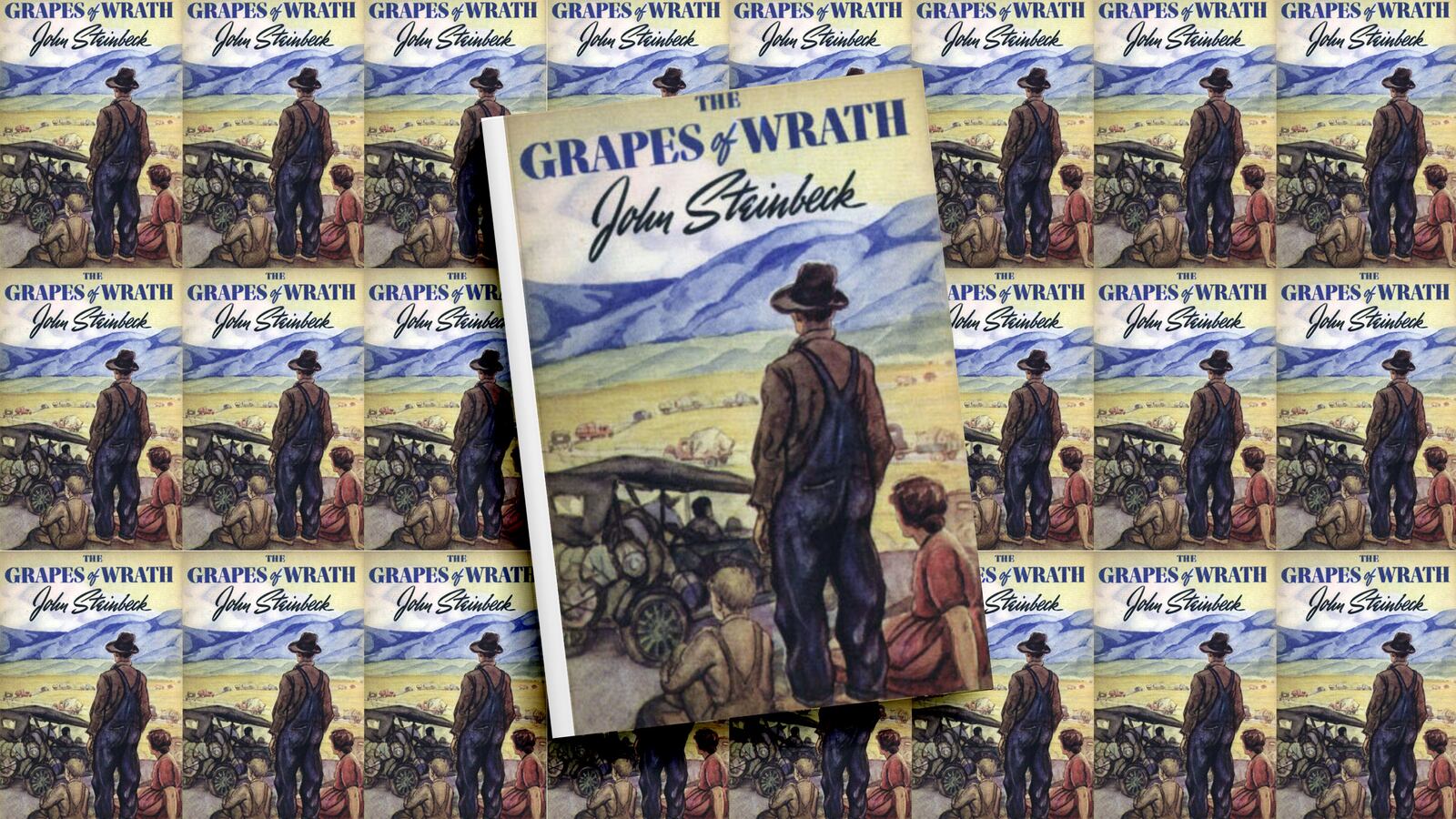It could not be more fitting that the 80th anniversary of John Steinbeck’s The Grapes of Wrath falls on Palm Sunday this year. Steinbeck’s 1939 depiction of the fictional Joad family after they, like thousands of others, have been forced off their failing Oklahoma farm, is as much a religious tale of unearned suffering as a political account of the Great Depression.
What makes the Joads’ migrant story—and by extension the stories of other Dust Bowl families of the ’30s—especially poignant in 2019 is the perspective it casts on the trials so many immigrant families face today trying to start new lives in the United States after fleeing their home countries. Except for the brief time they spend in a government-run camp for migrants, the Joads are constantly made to feel unwelcome once they take to the road.
The Grapes of Wrath begins with Tom Joad, the eldest Joad son, returning to his family after being paroled from the Oklahoma State Penitentiary, where he was sent after being convicted of killing a man in a drunken fight. It is through Tom’s eyes that we first see how his family’s life has been turned upside down.
At the core of the Joads’ ordeal is the shock of being thrown off their own land. The Joads have never made a great living, but tenant farming has given them reliable work. Now they must start all over by hiring themselves out.
Being forced to leave their land against their will and look for new jobs in California unmoors the Joads. The car carrying them, an old Hudson that has been cut in half and turned into a truck, contains Ma and Pa Joad, Uncle John, two grandparents, six children, the husband of the pregnant Rose of Sharon, the eldest of the Joad daughters, plus the ex-preacher, Jim Casy, a family friend.
The Joads’ car, Steinbeck notes, has become their “new hearth, the living center of the family.” The car is way too cramped to offer the comfort of a real hearth. It is a way station at best. What is striking about the Joads at this point in their lives is that they have kept their decency intact. When Ma Joad is asked about taking Jim Casy with them, she replies, “I never heerd tell of no Joads or no Hazletts, neither, ever refusin’ food an’ shelter or a lift on the road to anybody that asked.”
Most important for Ma Joad is keeping her family together. “All we got is the family unbroken,” she says. But on the road, Ma Joad learns that her family cannot survive alone. The Joads are aided by the Wilsons, another migrant family, when Grandpa Joad suffers a stroke, and they realize that when they have food, they cannot eat in front of others who are hungry. “Use’ ta be the family was fust. It ain’t so now. It’s anybody,” Ma Joad concludes before long.
The greatest obstacle to the Joads is not their own poverty. It is those who see them as a threat. In town after town, local police and sheriffs, acting like a ’30s version of today’s Immigration and Customs Enforcement (ICE), constantly harass the Joads, who, to their dismay, find that their Oklahoma roots have become a liability. “Okie use’ ta mean you was from Oklahoma,” Tom says. “Now it means you’re a dirty son-of-a-bitch.”
When the Joads get to California, they come upon a land filled with vineyards and orchards glowing in the morning sun. But this prosperity is not theirs to share in. Their modern Exodus has not brought them to a promised land. The wages they make when they get work are so low they cannot save any money. And when a group of workers on one of the farms where the Joads stop try to form a union, the workers are beaten back.
Jim Casy is killed by a gang of strikebreakers, and Tom Joad, who will be returned to prison if he is arrested, is forced to leave his family behind after he gets into a fight defending Casy and becomes a wanted man.
Tom’s departing words to his mother are, “Wherever they’s a fight so hungry people can eat, I’ll be there. Wherever they’s a cop beatin up a guy, I’ll be there.” Tom has changed for the better, but his flight diminishes the Joad family. Steinbeck’s novel ends with the remaining Joads taking shelter in an abandoned boxcar during a heavy rainstorm.
In the final scene of the novel, Rose of Sharon, deserted by her husband, feels bereft after losing her baby in childbirth, but when she and Ma Joad come across a starving man, Rose of Sharon feeds him with the milk from her still-full breasts. It is a deeply moving gesture, a sign of how much Rose of Sharon has matured, but it is not a gesture that suggests a solution to the economic problems faced by the Joads and those like them.
In the Great Depression, few saw more clearly the limits of what isolated individuals could accomplish politically than President Franklin Roosevelt. Throughout his time in office, FDR described the goals of his administration in religious terms. “Your government is still on the same side of the street with the Good Samaritan and not those who pass by on the other side,” Roosevelt declared as he campaigned for a second term in office.
Yet, it was World War II, not the economic programs of the New Deal, that finally brought unemployment down into the single digits and allowed families like the Joads to find work in the wartime industries that in the ’40s flourished on the West Coast, particularly in California.
Small wonder, then, that Steinbeck, who in 1939 had no way of foreseeing the changes World War II would bring about, ended The Grapes of Wrath by focusing on Rose of Sharon’s act of kindness rather than on systemic reform. Steinbeck admired Rose of Sharon just as today we both admire and acknowledge the limits of the Sanctuary Movement’s defense of at-risk immigrants and asylum seekers.







